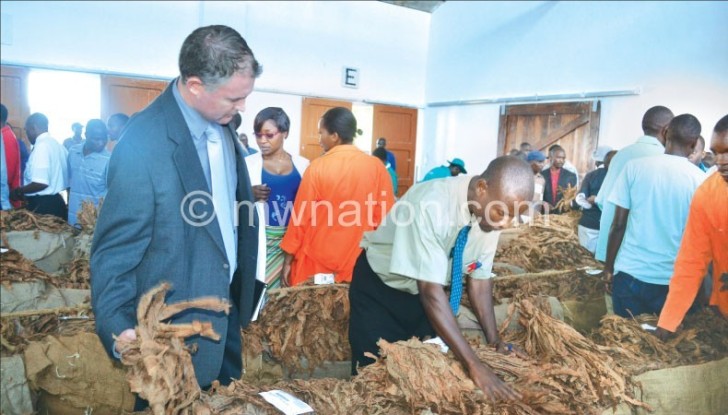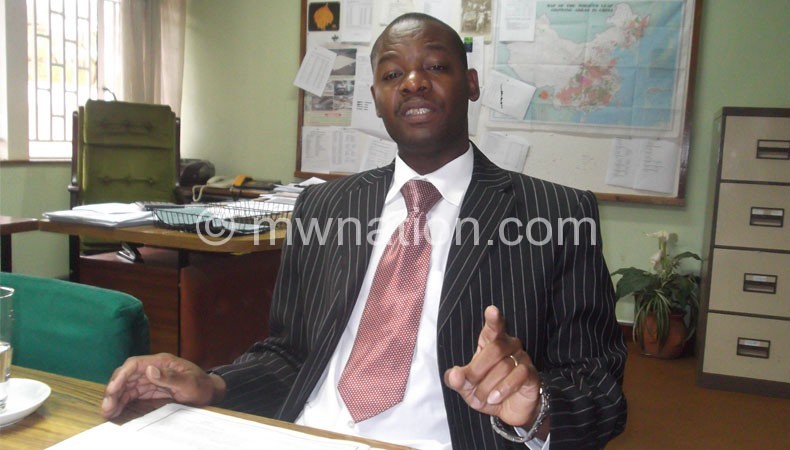2015: when Malawi tobacco went up in smoke
The year 2015 goes down the lane as the year Malawi’s green gold faced numerous challenges ranging from high rejection rates, low prices mostly to non-funded farmers, overproduction and frequent stoppages of sales.
The 193 million kilogrammes (kg) that were produced raked in $337.4 million, compared to 192 million kg in 2014 attracting $361.6million. To tobacco growers who work like horses in their fields, the misery suffered in the industry is a big blow.
Investing $2 500 on a single hectare of burley tobacco and realising $2 500 (from the fields to the auction floors), after sales was not worth the sweat according to Tobacco Association of Malawi (TAM) president Reuben Maigwa and chief executive officer Graham Kunimba
For the average farmer, challenges started way before the marketing season. The season was marked by drought and floods that hit the country in January 2015.
As a result, the marketing season started in April, due to late onset of rains and lasted for 27 weeks two weeks longer than in 2014.

Contract farming
Between 350 000 and 400 000 growers felt the pinch of the anti-tobacco campaign as their take home from sales plummeted.
Buyers concentrated on contracted growers shunning the farmers selling their leaf under auction system offering low prices to tobacco sold under auction system.
By week 20 of sales, burley under auction averaged $1.53 per kg against an average price of $1.72 on contract.
Statistics indicate that out of 30 million kgs of burley sold under auction system, $44 million was realised compared to 137.8 million kg on IPS attracting $236.1 million.
While 2.1 million kg of flue-cured tobacco was sold on auction valued at $3.3 million against 21 million kg on contract selling at $50.8million.

However, as sales progressed other growers were removed from the contract system.
In an interview in October, AHL Group corporate affairs manager Mark Ndipita said 2 432 burley tobacco growers, four dark-fired and 359 flue-cured farmers were removed from the contract system.
The growers were abandoned despite not exhausting the contracted volumes.
Ndipita said growers should not be trapped in one system
“They should choose which market system to use either IPS or non contract,” Ndipita said.
All this was happening despite the growers petitioning Parliament and Ministry of Agriculture, Irrigation and Water Development voicing their concerns with IPS.
Kunimba also told Business News the year was bad for a tobacco farmer. He said most farmers felt buyers were only concerned with recovering their loans; thereafter growers were abandoned.
As for Maigwa, the year was just depressing.
“It was depressing for buyers to prioritise contracted leaf only and yet all growers use the same resources in tobacco production only that one opts to enter into a contract with a buyer while the other opts for self sponsorship,” Maigwa said.
Maigwa said growers have been put on a tight spot as Malawi leaf’s international customers are demanding compliancy to environmental friendly agricultural practices that includes afforestation and no child labour which they say can only be achieved through contract tobacco farming.
“We don’t want auction to die, it provides checks and balances on the market,” Maigwa said.
Contrary to the agreed sales policy of selling 70 percent on contract and 30 percent under the auction system; by the end of the 2015 marketing season only 17 percent was sold under auction marketing system while 83 percent was sold under IPS.
Out of the 192 million kg produced, 168 million kg was burley as compared to 158 million kg in 2014 representing a six percent oversupply on burley, while 23 million kg of flue-cured tobacco were produced against 31 million kg in 2014 recording a 26 percent drop.
Out of these 82 percent of burley was sold on contract while 91 percent was sold on contract for flue cured tobacco.
“Because of these challenges experienced, growers were the losers,” said Ndipita.
However recently the Tobacco Processors Association (an association of traditional buyers) has thrown its weight behind IPS saying it gives buyers audited proof that tobacco in the country, is grown in a sustainable and compliant manner.
Limited competition
Although, two new comers entered the market, there was limited competition which also led to low prices.
Tobacco Control Commission (TCC) research and marketing officer Hellings Nasoni said the commission licensed African Tobacco Services (ATS) from South Africa and Vision Tobacco (Vision) from China.
Nasoni said the buyers operated from Lilongwe Auction floors. ATS bought burley and Vision bought both burley and flue-cured tobacco.
The buyers joined the traditional buyers including Malawi Leaf Tobacco Company, Japan Tobacco International (JTI Leaf Malawi), Limbe Leaf Tobacco Company (LLTC), Premium TAMA Tobacco Leaf Company (PTTL), and Alliance One International (AOI).
However RWJ Wallace, another traditional buyer, withdrew in 2015.
These buyers stuck to the minimum prices both on leaf sold on contract and auction system.
Low and unstable prices
Although the marketing season experienced low prices on both contract and auctioned tobacco, the prices were lower for non contract tobacco.
Average price for the leaf dropped by seven percent as burley registered a six percent plunge while flue cured leaf was down by three percent.
Only dark fired tobacco registered a 10.7 percent increase.
By week 20 of sales, prices ranged from a minimum of 85 cents per kilogram to $4.50 against 2014’s $1.76.
Flue-cured tobacco fetched as little as 25 cents per kilogram to $4 against $2.65 in 2014.
It was not surprising therefore that at the close of the marketing season in September, Malawi earned $337.4 million from the sales representing an eight percent drop from $361.6million in 2014.
The country’s production was at 193 million kilograms compared to 192 million kilograms in 2014.
TCC attributed the lower prices to overproduction.
Recently the Minister of Agriculture, Irrigation and Water Development Allan Chiyembekeza blamed overproduction on failure by TCC to manage production quotas of growers and late submitting of trade requirement.
But Maigwa also attributed the over production to leaf smuggling from neighbouring Zambia and Mozambique.
High rejection rates
It never rained but poured for the grower selling under the auction marketing system as the rejection rates were high.
The rejection rate hit a record high of 97 percent for both Burley and flue cured tobacco under the auction system.
The future
Despite the challenges faced in 2015, both growers and buyers are upbeat about the future of the crop.
Currently, 26 000 growers have registered against 39 800 last season.
Maigwa said the registration exercise which ended on December 31, was marred by network failures and congestion.
“Some growers would spend a day or two at the centres just to get registered,” said Maigwa.
He said there are fears that we might overproduce again on burley as the trade requirement is between 140 million kgs to 150 million kgs.
According to Ndipita, the tobacco industry should use the challenges as opportunities to improve in 2016 marketing season.
“We need to stick to quotas to avoid overproduction and there is need for dialogue among stake holders whenever there is a challenge on pricing and other issues,” Ndipita said.
He said growers should also understand contract terms.
Ndipita said merchants should also not double as buyers and growers.
“They should leave farming to farmers,” he said.
Ndipita said only fully sponsored growers should be compelled to sell under IPS.
While TCC’s Nasoni said apart from crop size management, there is need to strengthen monitoring and evaluation in monitoring global production trends and devising effective delivery and offloading modalities.n





